|
|
|
Sort Order |
|
|
|
Items / Page
|
|
|
|
|
|
|
| Srl | Item |
| 1 |
ID:
184863
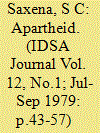

|
|
|
| 2 |
ID:
190047
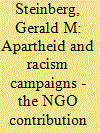

|
|
|
|
|
| Summary/Abstract |
Under the headings of promoting human rights and international law, the influential network of non-governmental organisations (NGOs) has been a central actor in the political war targeting Israel though allegations of apartheid and racism. In applying these slanders, the NGOs systematically erase the history of the Arab-Israeli conflict, including decades of warfare and terrorism, and join in the attempt to delegitimize the nation-state of the Jewish people, regardless of borders, and as distinct from criticism of Israeli policies regarding territory occupied in the 1967 war. This process constitutes the essence of post-Holocaust or ‘new antisemitism’, as included in the consensus working definition published by the International Holocaust Remembrance Alliance. The NGO campaigns are constructed on the foundations established by the Soviet and Islamic blocs culminating in the 1975 UN ‘Zionism is racism’ resolution. This theme was revived in the NGO Forum of the 2001 Durban Conference, led by Human Rights Watch, Amnesty International, and Palestinian groups such as Al-Haq, and used to justify appropriating the methods of the South African anti-apartheid campaign, including boycotts and lawfare. After the Durban conference and for 20 years since, this NGO network continued and expanded the campaign based on the apartheid and racism allegations. Their claims were amplified in media platforms, international bodies, anti-Israel church groups and on university campuses in the form of ‘Israel apartheid weeks’. European governments enabled activities of the Palestinian and Israeli NGOs through substantial funding, estimated at 120 million Euros annually. In 2020 and 2021, the NGO emphasis on these themes increased, led by HRW, and supporting the decision of the ICC prosecutor to accept jurisdiction over Palestinian claims and to open investigations against Israel. This context amplified the potency of the allegations of apartheid and racism in attempts to demonise Israel.
|
|
|
|
|
|
|
|
|
|
|
|
|
|
|
|
| 3 |
ID:
154303
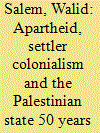

|
|
|
|
|
| Summary/Abstract |
With the Palestinians facing a belligerent occupation, an apartheid system that favors Jewish settlers and a growing settler colonial project, the Israeli-Palestinian conflict is becoming chronic, an ongoing Nakba.
|
|
|
|
|
|
|
|
|
|
|
|
|
|
|
|
| 4 |
ID:
113988


|
|
|
|
|
| Publication |
2012.
|
| Summary/Abstract |
De-legitimization of the State of Israel is the current episode in a persistent genocidal project aimed at the Jews and, more profoundly, at the values inherent in Judaism and shared by civilized societies. Skirting the shame attached to anti-Semitism after the horrors of the Holocaust, contemporary advocates of the genocidal plot are given free rein to attack Jews by a combination of severe criticism of the State of Israel and well-meaning plans for its geopolitical future, i.e. the peace process. Ugly lies - the Jews stole the land from the Palestinians, Israel is an apartheid state - function like the age-old charges that justified persecution of the Jews as Christ killers. Beautiful lies - the two state solution that everyone knows - echo the proto-legalistic measures that gradually deprived European Jews of their rights, their strength, their resources and capacity to resist deportation and extermination. Americans, misinterpreting as a repetition of the 1930s the rise of violent anti-Semitism in Europe at the dawn of the twenty-first century, are unprepared to deal with a parallel rise in Muslim Brotherhood forces within the US. As brutal Islamic Jew hatred boils in an Arab-Muslim world revolting, reforming, and submitting to sharia law, the Obama administration conducts a policy of the outstretched hand and blindfolded eyes that leaves Iran free to develop the ultimate genocidal weapon. Israel is the bulwark, not only for Jews but for the free world. Clear thinking, uncompromising discourse, and resolute action - at the risk of being labelled extremist - can stop the genocidal project and, working backward, disarm the lies.
|
|
|
|
|
|
|
|
|
|
|
|
|
|
|
|
| 5 |
ID:
178795
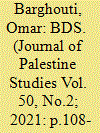

|
|
|
|
|
| Summary/Abstract |
Despite its military, diplomatic, and economic power, Israel’s regime of military occupation, settler colonialism, and apartheid still views the nonviolent, Palestinian-led global Boycott, Divestment, Sanctions (BDS) movement as a “strategic threat” to its system of injustice, waging a protracted war against the movement accordingly. This essay aims to contextualize Israel’s war on BDS by examining the movement’s origins, principles, impact, and theory of change. It analyzes the most critical challenges BDS is facing and its most promising strengths, especially its balancing of ethical principles with strategic effectiveness and its intersectional approach to the struggle for Palestinian freedom, justice, and equality.
|
|
|
|
|
|
|
|
|
|
|
|
|
|
|
|
| 6 |
ID:
113764
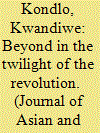

|
|
|
|
|
| Publication |
2012.
|
| Summary/Abstract |
The debate about the outcome of the negotiated settlement that ended South Africa's anti-apartheid struggle rages on. The author of this article, who is also on the side of the debate that argues that South Africa's Black majority was short-changed by the outcome, affirms that argument here, and insists that negotiated settlement amounts to 'surrendered revolution' that allowed White South Africans to retain monopoly of the economy. He enjoins 'progressive forces' in South Africa to remobilize and finish the 'unfinished revolution' that will achieve a different outcome, which will right the historic economic wrong that consigned and keeps South Africa's Black majority in crushing poverty.
|
|
|
|
|
|
|
|
|
|
|
|
|
|
|
|
| 7 |
ID:
134224
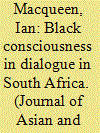

|
|
|
|
|
| Publication |
2014.
|
| Summary/Abstract |
This article examines a progressive moment under apartheid referred to retrospectively as 'the Durban moment' by activists. By exploring the friendship of assassinated activists Stephen Bantu Biko and Richard Turner, the paper calls for a nuanced assessment of the rich context of the emergence of Black Consciousness under apartheid, and shows how the rigid racial and ethnic categories imposed by the state could be challenged by creative and resourceful intellectuals. The paper draws on interviews, writings produced at the time, court transcripts and the secondary literature to argue that Black Consciousness was intimately linked on many levels to this progressive 'moment' in South Africa under apartheid, which has resonances for activists still today.
|
|
|
|
|
|
|
|
|
|
|
|
|
|
|
|
| 8 |
ID:
124363
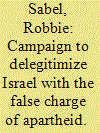

|
|
|
|
|
| Publication |
2011.
|
| Summary/Abstract |
The comparison of Israel to South Africa under white supremist rule has been utterly rejected by those with intimate understanding of the old Apartheid system. Israel is a multiracial and multi-colored society, and the Arab minority actively participates in the political process. Incitement to racism in Israel is a criminal offence, as is discrimination on the basis of race or religion. The accusation is made that the very fact that Israel is considered a Jewish state proves an "Apartheid-like" situation. Yet the accusers have not a word of criticism against the tens of liberal democratic states that have Christian crosses incorporated in their flags, nor against the Muslim states with the half crescent symbol of Islam. For Arab states to denote themselves as Arab Republics is not objectionable.
|
|
|
|
|
|
|
|
|
|
|
|
|
|
|
|
| 9 |
ID:
193270
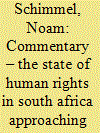

|
|
|
|
|
| Summary/Abstract |
As South Africa approaches 30 years of democracy, it is important to pause to reflect and analyze the trajectory of human rights since the fall of the apartheid regime and the advent of multiracial democracy. Although there was a large global movement against apartheid, this movement's vigilance for human rights in South Africa quickly declined and dissolved with the advent of South African democracy. There is little critical engagement with South Africa's contemporary human rights record and policies by global human rights activists, nongovernmental organizations, and civil society and still less active campaigning in defense of the human rights of South Africans, especially South Africa's most vulnerable and disadvantaged black majority. The energy that was summoned to protest apartheid and to boycott it never returned since the advent of democracy. This commentary explores the current state of human rights in South Africa, their prospects, and challenges to their respect, protection, and fulfillment.
|
|
|
|
|
|
|
|
|
|
|
|
|
|
|
|
| 10 |
ID:
027183
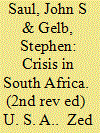

|
|
|
|
|
| Edition |
2nd rev ed
|
| Publication |
U. S. A., Zed Books, 1986.
|
| Description |
245p.
|
| Standard Number |
0862326931
|
|
|
|
|
|
|
|
|
|
|
|
Copies: C:1/I:0,R:0,Q:0
Circulation
| Accession# | Call# | Current Location | Status | Policy | Location |
| 027482 | 323.168/SAU 027482 | Main | On Shelf | General | |
|
|
|
|
| 11 |
ID:
117507
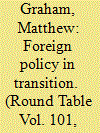

|
|
|
|
|
| Publication |
2012.
|
| Summary/Abstract |
At the beginning of the transition from apartheid to democracy, the African National Congress (ANC) was unprepared for foreign policy discussion, a lack of readiness magnified by the collapse of international Communism and the Cold War ideology. President De Klerk and the National Party controlled foreign policy in the early years of the transition and began the process of reintegration with the international community, The ANC initially struggled to adapt to the new international situation, whereas De Klerk was successful in wooing the international community. In the later stages of transition, the ANC developed a greater sense of direction and substance in foreign relations, although there were differences of opinion among and between the leadership and the rank and file. Already in 1994 there was evidence of tension between idealism and pragmatism. Post-apartheid foreign policy under Mandela was riddled with inconsistencies, which stemmed from the events of South Africa's transition
|
|
|
|
|
|
|
|
|
|
|
|
|
|
|
|
| 12 |
ID:
135036
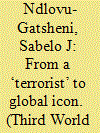

|
|
|
|
|
| Summary/Abstract |
This article examines Nelson Rolihlahla Mandela’s political life and legacy from the perspective of critical decolonial liberation ethics, which privileges a paradigm of peace, humanism and racial harmony and opposes the imperial/colonial/apartheid paradigm of war, racial hatred and separation of races. This system emerged in the 15th century and was driven by the desire to conquer, dispossess, colonise, exploit and segregate people according to race and, alongside imperatives of primitive accumulation, it informed the colonisation of South Africa and the imposition of apartheid. Mandela was a liberation fighter who provided an antidote to the colonial ideology of racial profiling and hierarchisation. What distinguished him from other freedom fighters was his commitment to the cause of human rights as early as the 1960s, long before it attained its status as a constitutive part of global normative order. When Mandela became the first black president of a democratic South Africa, his practical and symbolic overtures to whites and his reconciliatory politics aimed to call them back to a new inclusive humanity. Critical decolonial ethics logically enables a tribute to Mandela that privileges his commitment to a post-racial society and new humanism.
|
|
|
|
|
|
|
|
|
|
|
|
|
|
|
|
| 13 |
ID:
164377
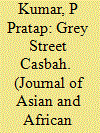

|
|
|
|
|
| Summary/Abstract |
In this paper, I wish to explore the life in the mid-19th to 20th century in the Durban-based Indian Casbah and its enduring legacy. In exploring the Casbah life in Durban, I wish to pay special attention to the narratives of the people who either were associated with it and had living memories of it, or remember the many stories passed on to them by their families.1 The central question that I explore in analysing these narratives is: does Casbah in the diaspora enable the diasporic community to reconnect with their Indian origins or does it orient them away from the romantic attachment to the places of their origin in India? In other words, is Casbah a symbol of a new settlement in which the diasporic community finds lasting meaning and legacy, or does it evoke memories and myths about their origins in India?
|
|
|
|
|
|
|
|
|
|
|
|
|
|
|
|
| 14 |
ID:
112395
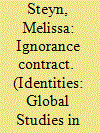

|
|
|
|
|
| Publication |
2012.
|
| Summary/Abstract |
Working with the recollections of everyday experiences of apartheid collected by the Apartheid Archives project, and drawing on the emerging theorization of ignorance in the critical philosophy of race, this article explores how an 'ignorance contract' - the tacit agreement to entertain ignorance - lies at the heart of a society structured in racial hierarchy. Unlike the conventional theorization of ignorance that regards ignorance as a matter of faulty individual cognition, or a collective absence of yet-to-be-acquired knowledge, ignorance is understood as a social achievement with strategic value. The apartheid narratives illustrate that for ignorance to function as social regulation, subjectivities must be formed that are appropriate performers of ignorance, disciplined in cognition, affect and ethics. Both white and black South Africans produced epistemologies of ignorance, although the terms of the contract were set by white society as the group with the dominant power.
|
|
|
|
|
|
|
|
|
|
|
|
|
|
|
|
| 15 |
ID:
068053
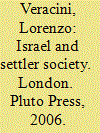

|
|
|
|
|
| Publication |
London, Pluto Press, 2006.
|
| Description |
154p.pbk
|
| Standard Number |
0745325009
|
|
|
|
|
|
|
|
|
|
|
|
Copies: C:1/I:0,R:0,Q:0
Circulation
| Accession# | Call# | Current Location | Status | Policy | Location |
| 050938 | 956.9405/VER 050938 | Main | On Shelf | General | |
|
|
|
|
| 16 |
ID:
187771
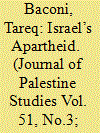

|
|
|
|
|
| Summary/Abstract |
This essay offers a critical reading of the mainstreaming of the narrative, long advocated by Palestinians, that Israel is perpetrating the crime of apartheid against the Palestinian people. It argues that partitioning the land of Palestine, which the Palestinian leadership acquiesced to, is a cornerstone of apartheid, and a legitimation of the Zionist movement. Rather than partition, the piece calls for a political strategy of decolonization that aims at dismantling the regime of apartheid that the Zionist movement instituted in Palestine in 1948.
|
|
|
|
|
|
|
|
|
|
|
|
|
|
|
|
| 17 |
ID:
152124
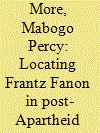

|
|
|
|
|
| Summary/Abstract |
There is a huge re-emergence of Frantz Fanon’s ideas and an equally huge interest in his work in post-apartheid South Africa, both in the academy and social movement and organizations. Contrary to some commentators, particularly his biographers, this article aims to locate Fanon within the South African struggle for liberation. It is argued here that Fanon, throughout his life, as evidenced by his writings, was highly concerned about apartheid just as he was about French Algerian colonialism. For him, the paper claims, apartheid was synonymous with colonialism and therefore his critique of colonialism was just as much a critique of apartheid. The resurgence of his name and ideas in the country is a consequence of this critique.
|
|
|
|
|
|
|
|
|
|
|
|
|
|
|
|
| 18 |
ID:
171179
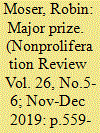

|
|
|
|
|
| Summary/Abstract |
This article focuses on the final years of South Africa’s nuclear-weapon program, particularly on the decision-making process leading up to the signature of the 1968 Treaty on the Non-Proliferation of Nuclear Weapons (NPT) by the South African government in 1991. In August 1988, after two decades of defiance, negotiations between the apartheid government and the NPT depository powers (the United Kingdom, the United States, and the Soviet Union) ensued at the International Atomic Energy Agency (IAEA) in Vienna. Despite South Africa being the only state to give up its indigenously developed nuclear weapons and subsequently join the nonproliferation regime, little is known about how the national position on NPT accession and IAEA safeguards evolved. Research carried out in multiple archives using hitherto untapped primary sources and interviews with key actors from several countries show how domestic and regional political dynamics influenced Pretoria’s position on entering the nonproliferation regime. In the process, the F.W. de Klerk government managed to skillfully exploit international proliferation fears to advance its own agenda, thereby connecting South African NPT accession with that of the neighboring Frontline States coalition of Angola, Mozambique, Tanzania, Zambia, and Zimbabwe.
|
|
|
|
|
|
|
|
|
|
|
|
|
|
|
|
| 19 |
ID:
006382
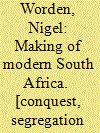

|
|
|
|
|
| Edition |
2nd ed.
|
| Publication |
Oxford, Blackwell, 1995.
|
| Description |
xvi, 171p.: mapspbk
|
| Series |
Historical Association Studies
|
| Standard Number |
0631198822
|
|
|
|
|
|
|
|
|
|
|
|
Copies: C:1/I:0,R:0,Q:0
Circulation
| Accession# | Call# | Current Location | Status | Policy | Location |
| 038038 | 968/WOR 038038 | Main | On Shelf | General | |
|
|
|
|
| 20 |
ID:
185580
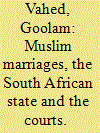

|
|
|
|
|
| Summary/Abstract |
A central feature of South Africa's legal system under white minority rule was the state's institutionalisation of racist structures and a distinct Christian bias in religious matters. Muslim marriages were not recognised because they permitted polygamy. Majority rule in 1994 resulted in the adoption of a new constitution that recognised non-Christian and ‘non-European' beliefs and practices, and some Muslims lobbied for the legal recognition of Muslim marriages. While the new political context was sympathetic to accommodating multicultural practices, legislation stalled because of differences among Muslims over what constitutes Muslim Personal Law (MPL). This article focuses on debates in South Africa on state governance of Muslim family law and how, in the void created by the absence of legislation, the country’s courts have seized the initiative through ex-post facto recognition of the consequences of Muslim marriages. South Africa thus represents a peculiar case of the courts recognising the consequences of Islamic marriages, even while Parliament has failed to write this into law. As such, South Africa provides a stark contrast to many other countries where there is acrimonious debate over legal pluralism and, in particular, accommodating MPL.
|
|
|
|
|
|
|
|
|
|
|
|
|
|
|
|
|
|
|
|
|